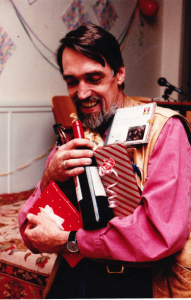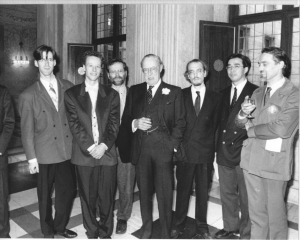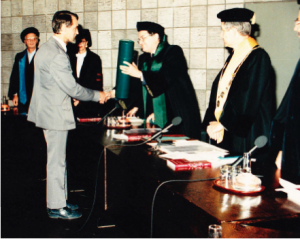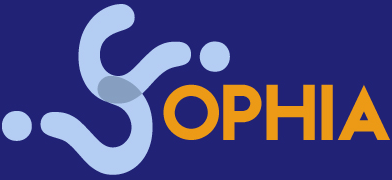By Pieter Mostert

Karel and I met for the first time in September 1976. I was a master student in philosophy, he was one of the lecturers. One of his colleagues asked me whether I was interested in becoming his teaching assistant. There were hundreds of students in social science that had to be pushed through the obligatory philosophy course and he simply wasn’t motivated to do that any longer. I had been studying philosophy for five years and had slowly but gradually figured out what it was about. And coming from a teaching family I had an interested in teaching. So I got the job and decided that it might be useful to sign up for the course “teaching philosophy outside academia”, which was offered by Karel, as he was the only member of staff with experience in teaching philosophy outside the university (he taught philosophy in a professional programme for social work). I shared my plans and experiences. Karel’s feedback was always sharp and without any compromise, not very practical, but definitely helpful. It made me think better.

In 1978 I finished my studies and started teaching in several professional programmes: social work, nursing, library. In those years I looked around for different approaches and teaching methods. Karel and I met rarely. That changed in 1980, when I was appointed to a teaching position at the Erasmus University in Rotterdam similar to his at the University of Amsterdam. Early 1981 we sat together for an outline of a joint research project, which would lead to a PhD, which we finished in 1988. My first contribution to the research project was a literary review: what is going on in different countries, what is the dominant approach and what literature is available. It struck us how national traditions were: in the Netherlands philosophy was mainly taught in a ‘propaedeutic’ way, in Germany it was mainly devoted to reading selected texts from famous philosophers, in France it was devoted to essay writing, and so on.

From all we read two initiatives immediately stood out for us and caught our interest: it was the German tradition of ‘Socratic dialogue’, developed within the school of Leonard Nelson and the materials of Matthew Lipman and his IAPC, creating opportunities for children to engage with philosophical questions. Why?
First of all, it was both Karel’s and my personal experience that at university you may study philosophy and learn a lot about philosophy, but you learn very little about the doing of philosophy. Therefore teaching philosophy outside academia is mainly done through a simplified, watered down version of what is taught at university. Our favourite comparison was tea and teabags: when the philosophy programme at university is like the first cup of tea from a fresh tea bag, the programme outside university may be the third of fourth cup of tea from that same teabag: tasteless.
Both of us were struck, appalled by the tastelessness of philosophy programmes. And we were convinced that the only way to bring back the flavour is by practising the ‘doing’ of philosophy. For us, both the practice of the Socratic dialogue and P4C were encouraging and challenging attempts to practise the doing of philosophy.
But there was more. For me, by that time, doing philosophy should be practised in the questioning style of Socrates and Nietzsche, best summarized in the rule “before we start answering the question we should first enquire whether this is the real (philosophical) question”. For Karel what’s at stake in philosophy was slightly different. His main interest was in Chinese philosophy, not the popular westernized version from the seventies – few things could irritate him more than glorifications of eastern philosophy by reducing them to some westernized mish-mash – but careful reading of classical texts, with all the source books and commentaries on the table. Karel in his own medieval monastery cell – that is where philosophy is done and where it develops. The distance from here to philosophy for children may seem vast, but for him it wasn’t. At least, as long as philosophy for children is devoted to the same scrutiny of concepts and categories. More bluntly said: as long as teachers avoid the mistake which many people make when reading about Chinese philosophy, namely that they read their own concepts into it, whether it is the Chinese philosophical text or the children’s expressions of their thoughts.
Karel mastered the skill of introducing an example or comparison at the right moment and let this example do the work of convincing the listeners. One day, when we were discussing what P4C should be about, he said “Pieter, don’t you know Borges’ story about the classification of the emperor of China?”. No, I didn’t, and when I read the story later that week I knew why Karel was devoted to studying Chinese philosophy and to developing philosophy for children: It’s about categories, how arbitrary they are and how hesitant we should be in assuming that our categories are correct and universal, because they make sense to us [Borges’ story is called “Celestial emporium of benevolent knowledge”; I would say: obligatory reading!].
In 1990 Karel and I took the initiative to found a Dutch Centre for Philosophy for Children. Shortly after we were approached by a group of educational consultants, who were developing a school programme to address bullying at schools. They wanted to hear from us what philosophy can do to prevent bullying. Karel’s reply was as clear and without compromise as always: all we can do is facilitate conversations with children in which we explore the category of bullying and related categories. P4C was born and it immediately showed its stubborn identity.
In 2013 Karel gave his final SOPHIA talk at our meeting in Amsterdam on the theme of ‘Diversity’.
Karel van der Leeuw born 1940 deceased 2015. Much missed by the SOPHIA & P4C Community.
SOPHIA is holding an annual memorial prize for Karel, for details on how to enter to win €500 visit the Karel van der Leeuw Memorial Prize page of our website.
